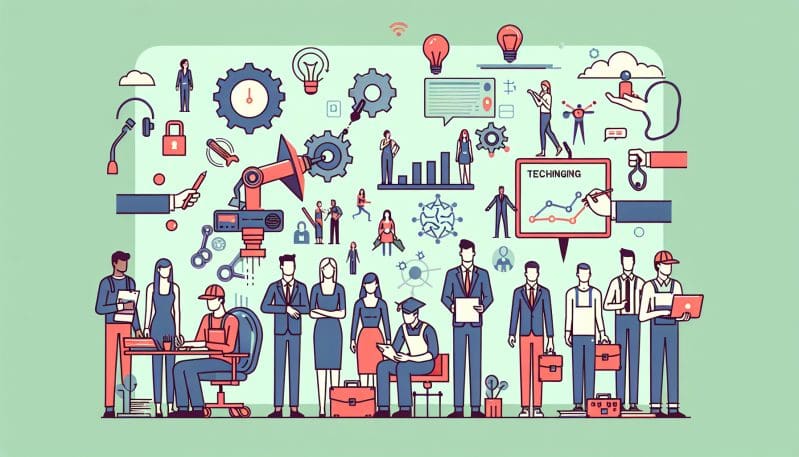Bridging the Skills Gap: Preparing Young Workers for a Shifting Job Landscape
- Home
- Bridging the Skills Gap: Preparing Young Workers for a Shifting Job Landscape

- Editors Desk
- March 11, 2024
- 0 Comments
As we progress further into the 21st century, the nature of work continues to evolve at a breakneck pace. Innovations in technology, the rise of the gig economy, and the impacts of global events have transformed the job market in ways that previous generations could scarcely have imagined. This creates an unprecedented challenge for young workers: the widening gap between the skills they possess and the skills needed for the jobs of tomorrow.
In our latest discussion, we delve into strategies to bridge this growing skills gap. We examine how educational institutions, businesses, and governments must collaborate to create a dynamic curriculum that not only keeps pace with technological advancement but also fosters critical thinking, creativity, and adaptability—skills that are quintessential for success in any job market.
We also explore how apprenticeships and vocational training can be modernized to offer practical, hands-on experience that complements academic learning. These are the avenues through which we can ensure that young workers are not just job-seekers but valuable contributors to a future they inherit. It’s a commitment to leaving no worker behind as we reimagine work in our rapidly changing world.
Tailoring Education to Market Needs
Educators are on the frontlines of the skills gap battle. By partnering with industry leaders, they can gain real-time insights into the evolving demands of the workforce. This partnership can drive a revolution in curriculum development, aligning educational offerings with the technical skills and soft skills employers are clamoring for. For example, coding bootcamps and digital marketing workshops are becoming more prevalent as they address specific gaps in the digital economy.
Rethinking Apprenticeships for the Modern Age
The age-old practice of apprenticeships is ripe for a makeover to fit the modern economic landscape. By combining traditional hands-on training with innovative technology such as virtual reality simulations, apprentices can gain valuable experience without the constraints of location or resources. Such modern apprenticeships can open doors to industries like renewable energy, data analysis, and cyber-security, which are poised for growth but lack a ready workforce.
Government’s Role in Facilitating Lifelong Learning
Governments across the globe have a pivotal role in shaping policies that encourage continuous learning and skill development. By offering tax incentives for companies that invest in employee training, or by subsidizing career development programs for individuals, policymakers can foster an environment where lifelong learning is not just encouraged but ingrained in the fabric of the employment ecosystem.
The Gig Economy as a Learning Platform
The rise of gig work offers an unconventional but potentially transformative educational experience. In the gig economy, young workers can dabble in various roles, projects, and industries, thereby gaining a diversified skill set and finding out where their true passions and aptitudes lie. It also encourages a mindset of flexibility and resilience, which are invaluable assets in an ever-changing job market.
Join the Conversation at #WorkCongress
As we continue these critical conversations, we invite you to join us at the upcoming #WorkCongress on May 1, 2024, where leading experts will share insights and actionable solutions for creating a more inclusive and adaptable workforce. Don’t miss the chance to be a part of shaping the future of employment. For more information and to register, visit https://workcongress.com.
Conclusion
Navigating the rapid changes in the job landscape demands concerted efforts to close the skills gap. By promoting dynamic educational pathways, redefining apprenticeships, advocating for supportive governmental policies, and embracing the learning potential within the gig economy, we can equip young workers to thrive in the workplaces of tomorrow. The mission of No Worker Left Behind extends beyond just addressing the challenges; it’s about fostering a proactive and resilient workforce ready to tackle the opportunities that lie ahead.
Choose Layout
Main Color Scheme
- RTL Version
- LTR Version
